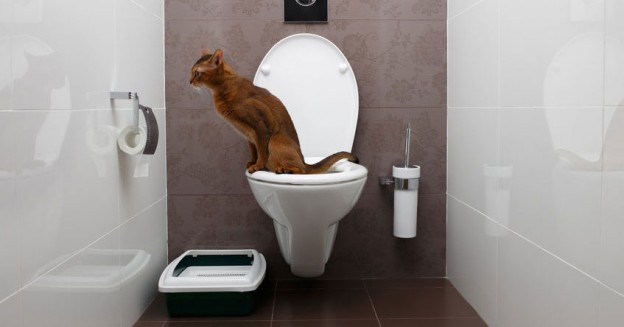Reasons Flushing Cat Poop Down Your Toilet May Cause Problems - Recommendations for Proper Handling
Reasons Flushing Cat Poop Down Your Toilet May Cause Problems - Recommendations for Proper Handling
Blog Article
Were you looking for content Don’t flush cat feces down the toilet?

Introduction
As pet cat owners, it's essential to be mindful of just how we deal with our feline buddies' waste. While it may seem convenient to flush feline poop down the toilet, this technique can have harmful repercussions for both the setting and human health and wellness.
Alternatives to Flushing
Fortunately, there are much safer and much more responsible methods to take care of pet cat poop. Think about the complying with alternatives:
1. Scoop and Dispose in Trash
One of the most typical method of getting rid of cat poop is to scoop it right into a naturally degradable bag and toss it in the trash. Be sure to make use of a specialized litter inside story and deal with the waste without delay.
2. Use Biodegradable Litter
Go with biodegradable feline clutter made from materials such as corn or wheat. These trashes are eco-friendly and can be safely taken care of in the trash.
3. Bury in the Yard
If you have a lawn, take into consideration hiding cat waste in a designated area far from veggie yards and water sources. Be sure to dig deep adequate to avoid contamination of groundwater.
4. Mount a Pet Waste Disposal System
Purchase a pet dog waste disposal system particularly developed for feline waste. These systems utilize enzymes to break down the waste, minimizing smell and environmental effect.
Health Risks
In addition to ecological problems, purging feline waste can also pose wellness dangers to humans. Pet cat feces might contain Toxoplasma gondii, a bloodsucker that can trigger toxoplasmosis-- a potentially serious health problem, particularly for pregnant females and individuals with weakened immune systems.
Environmental Impact
Purging pet cat poop introduces unsafe pathogens and bloodsuckers into the supply of water, presenting a considerable risk to aquatic ecological communities. These impurities can adversely influence marine life and concession water top quality.
Verdict
Accountable animal ownership extends beyond providing food and sanctuary-- it additionally entails appropriate waste monitoring. By avoiding purging feline poop down the bathroom and selecting alternate disposal methods, we can reduce our ecological footprint and protect human health.
Why Can’t I Flush Cat Poop?
It Spreads a Parasite
Cats are frequently infected with a parasite called toxoplasma gondii. The parasite causes an infection called toxoplasmosis. It is usually harmless to cats. The parasite only uses cat poop as a host for its eggs. Otherwise, the cat’s immune system usually keeps the infection at low enough levels to maintain its own health. But it does not stop the develop of eggs. These eggs are tiny and surprisingly tough. They may survive for a year before they begin to grow. But that’s the problem.
Our wastewater system is not designed to deal with toxoplasmosis eggs. Instead, most eggs will flush from your toilet into sewers and wastewater management plants. After the sewage is treated for many other harmful things in it, it is typically released into local rivers, lakes, or oceans. Here, the toxoplasmosis eggs can find new hosts, including starfish, crabs, otters, and many other wildlife. For many, this is a significant risk to their health. Toxoplasmosis can also end up infecting water sources that are important for agriculture, which means our deer, pigs, and sheep can get infected too.
Is There Risk to Humans?
There can be a risk to human life from flushing cat poop down the toilet. If you do so, the parasites from your cat’s poop can end up in shellfish, game animals, or livestock. If this meat is then served raw or undercooked, the people who eat it can get sick.
In fact, according to the CDC, 40 million people in the United States are infected with toxoplasma gondii. They get it from exposure to infected seafood, or from some kind of cat poop contamination, like drinking from a stream that is contaminated or touching anything that has come into contact with cat poop. That includes just cleaning a cat litter box.
Most people who get infected with these parasites will not develop any symptoms. However, for pregnant women or for those with compromised immune systems, the parasite can cause severe health problems.
How to Handle Cat Poop
The best way to handle cat poop is actually to clean the box more often. The eggs that the parasite sheds will not become active until one to five days after the cat poops. That means that if you clean daily, you’re much less likely to come into direct contact with infectious eggs.
That said, always dispose of cat poop in the garbage and not down the toilet. Wash your hands before and after you clean the litter box, and bring the bag of poop right outside to your garbage bins.
https://trenchlesssolutionsusa.com/why-cant-i-flush-cat-poop/

As a fervent person who reads about Can You Flush Cat Poop Down The Toilet?, I was thinking sharing that information was a good thing. Enjoyed reading our content? Please share it. Help somebody else locate it. Thank-you for your time invested reading it.
Book An Estimate Now Report this page